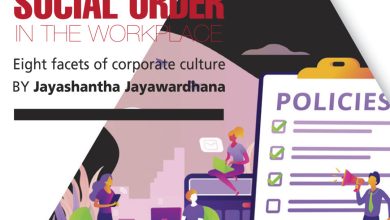
WHEN A JOB CAUSES STRESS
Employers must address this issue with workers and get a handle on the situation – Merilee Kern
As a result of the large number of health, economic, political and other macro crises of late, organisational stress is at an all-time high. For many, stress has become so burdensome that it is more than simply a personal issue, which can be placated with a few ‘mental health days’ out of the office.
Workplaces have become overwhelmed with employees struggling with stress – whether driven by feelings of unease, anxiety, depression, frustration or any number of unwanted emotions.
Given the current level of demands, pressures and uncertainties, employees and businesses can be severely undermined over time.
It’s clear that any number of stressors will continue to remain indelible and formidable foes. Since stress distracts and derails workers to the extent that it is reflected in bottom line impacts, employers are eager to find ways to deal efficaciously with this unfortunate reality.
This is understandable given the extensive amount of research that substantiates the calamitous effects of excessive levels of stress on employee performance. One notable cost of illness study estimates that the cost of work related stress ranges from US$ 221 million to 187 billion dollars.
A more inclusive analysis conducted by The American Institute of Stress found that after including factors such as absenteeism, turnover, diminished productivity and increased medical legal costs, the total economic impact of stress on American workers is estimated to be in the range of US$ 300 billion.
According to Chief Behavioural Science Officer at Fierce Dr. Gabe De La Rosa, businesses should have a proactive communication strategy to help address – and alleviate – staff stress and anxiety.
“It’s key to create cultures eliminating the gap between what people feel and what they say in workplace conversations as this is at the centre of what drives a lack of mental and emotional health,” says De La Rosa.
He explains: “Leaders who steer their groups toward eliminating this gap produce higher performing company cultures. When employees feel safe to truly show up as they are, they can invest more of themselves in their work roles.”
“While stress has always been a cause for operational unease, the pandemic has raised the stakes far higher. It has exacerbated concerns far beyond the health realm – a reality that can have grave consequences for individual businesses and industries at large,” De La Rosa elaborates.
His expertise on organisational stress can’t be overstated. De La Rosa has valuable experience measuring the impact of stress on individuals in the US Navy where he works as a contractor in the role of Industrial and Organisational Psychologist at the Naval Center for Combat and Operational Stress Control in San Diego, California.
He is responsible for understanding and enhancing organisational factors impacting performance among sailors and marines. His work has been published in peer reviewed empirical journals such as the Military Medicine Journal of Traumatic Stress; Addictive Behaviors; and Psychological Trauma: Theory, Research, Practice, and Policy.
De La Rosa has also edited books such as the Handbook of Employee Engagement, which is considered a valuable resource for organisational psychologists.
I connected with De La Rosa to discuss what business owners and managers can do to gain a better grip on organisational and operational stress. Here are extracts from that conversation…
Merilee Kern (MK): How would you say stress impacts our ability to tap into our relatively limited resources?
Gabe De La Rosa (GDLR): One of the commonly cited reasons for decreased performance under stress is that while employees are coping with elevated levels of it, they have fewer personal resources available to focus on constructive endeavours. This is because so much of their cognitive and emotional resources are focussed on dealing with the various stressors that they perceive.
Given the limited amount of physical, emotional and cognitive resources that any person has to devote to his work roles, it makes intuitive sense that when stress accumulates to a level that becomes unmanageable, adjustments must be made… or performance in one’s work and personal life will suffer.
This creates a vicious cycle: stress can lead to errors and errors can cause more stress. If employees anticipate some form of punishment, or feel they have no safety to experiment or make mistakes, innovation and creativity suffers and stress levels will rise.
MK: What about the stress of dealing with COVID-19 impacts at work?
GDLR: The well-established relationship between stress, and personal and professional consequences, is even more important in today’s reality. Today, employees are coping with traditional stressors such as excessive workloads or interpersonal conflicts with coworkers, clients or supervisors – all while attempting to manage a work role and personal life that’s impacted by a global pandemic.
The pandemic is something that is mostly out of any individual’s control. It’s constantly changing and completely unpredictable, and it is unlike anything we have dealt with previously. Situations like this are likely to elicit anxiety related symptoms such as excessive worry, loss of concentration and poor quality sleep.
MK: Can you share some insights on the efficacy of formalised stress management programmes in the workplace?
GDLR: For many of us, talking about our emotions is not a skill we’ve learned. In many workplaces, talking about our negative emotions has something of a taboo attached to it.
Oftentimes, employees internally feel one emotion but are forced to display another externally – and this can be incredibly taxing. That gap – the empty space between what we feel, and what we actually say in conversations and relationships – is in large part what drives a lack of mental and emotional health.
Research suggests that stress has an incredibly destructive impact on employee productivity, wellbeing and social relationships. Because of this well documented relationship, forward-thinking organisations have invested in resources designed to help their employees cope with stressors.
And research on the effects of stress management solutions reveals promising results. Those participating in stress management programmes tend to experience beneficial changes in psychological wellbeing, somatic symptoms and work based performance outcomes.






